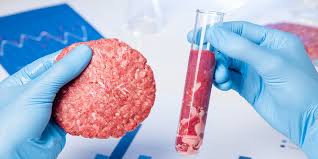Isaac Nicholas and Mike Silver - Tufts University
As the world’s demand for protein grows, food production needs to keep pace. Now a team led by a Tufts professor has received a five-year, $10 million grant from the U.S. Department of Agriculture to develop an alternative food source: meat produced not from farm animals, but from cells grown in bioreactors.
The team, led by David Kaplan, the Stern Family Professor of Engineering, and his team of graduate students, will combine the efforts of engineers, biologists, nutrition researchers, and social scientists at Tufts and other universities, all in an effort to enhance food sustainability, nutrition, and security.
Cultivated-meat production is emerging as an alternative source of sustainable protein to help address nutrition and food safety for consumer choices. Kaplan, who is a Distinguished Professor at Tufts and chair of the Department of Biomedical Engineering, and his team have led some of the early work in the field.
He says that this new industry could provide nutritious and safe foods while reducing environmental impact and resource usage—with a target of significant reductions in greenhouse gas emissions, land use and water use than traditional meat production.
To achieve these goals, the interdisciplinary teams will also work together to evaluate consumer acceptance of cultivated meat, measure the environmental impact of the manufacturing process, assess the economic viability compared to farm production, and prepare the next generation of the industry’s workforce.
“Part of our research will look at improving the nutritional content, shelf life, and other qualities of cell-based meat, along with assessments of impact on consumer perceptions and acceptance,” says Kaplan, whose team of Ph.D. students—Natalie Rubio, Andrew Stout, John Yuen, Michael Saad, Sophie Letcher, and Jake Marko—will be working with him on the effort.















